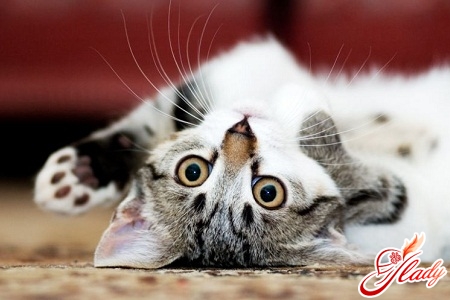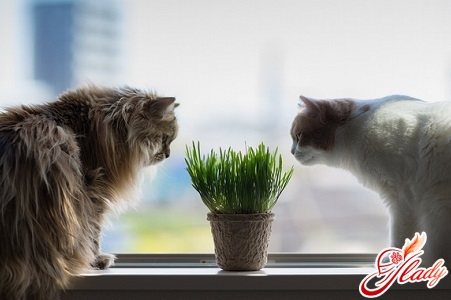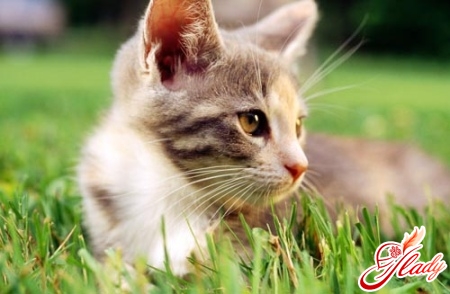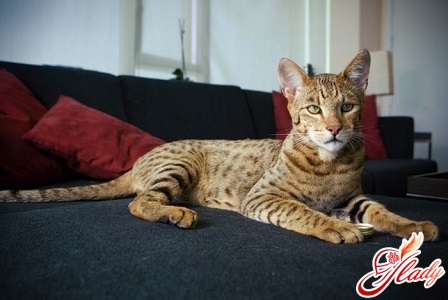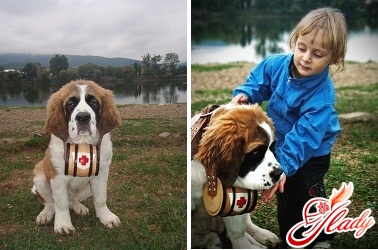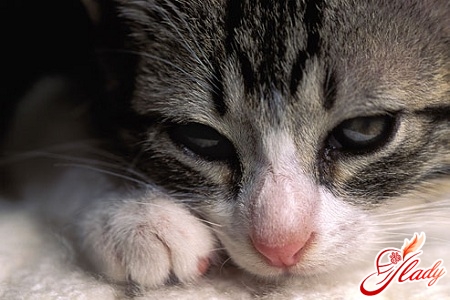 Such a nuisance as an intestinal disorder,We are familiar to all of us not by hearsay. And, alas, not only us (people). Animals also suffer from such disorders. And our pussies (adult cats and cats and little kittens) from time to time give us such surprises as diarrhea. And in fact diarrhea (you know) is not only a loose stool, but also pain and abdominal pain, nausea, lack of appetite and, as a result, dehydration of the body. For a cat, this stress, but not less stress, such a trouble is for the owners of the animal. Therefore, the owners begin to panic and immediately begin to treat the cat. However, diarrhea is not a disease, but a symptom. By the way, in a cat diarrhea can be caused not only by diseases, but also by stressful situations.
Such a nuisance as an intestinal disorder,We are familiar to all of us not by hearsay. And, alas, not only us (people). Animals also suffer from such disorders. And our pussies (adult cats and cats and little kittens) from time to time give us such surprises as diarrhea. And in fact diarrhea (you know) is not only a loose stool, but also pain and abdominal pain, nausea, lack of appetite and, as a result, dehydration of the body. For a cat, this stress, but not less stress, such a trouble is for the owners of the animal. Therefore, the owners begin to panic and immediately begin to treat the cat. However, diarrhea is not a disease, but a symptom. By the way, in a cat diarrhea can be caused not only by diseases, but also by stressful situations.
What causes diarrhea in a cat?
Even if your animal is healthy, diarrhea can be caused by the following reasons.
However, all this is an easily removable cause of diarrhea. Much worse is the case if the cause of diarrhea are diseases. What diseases are accompanied by diarrhea?
But do not immediately panic and weep from the thought ofthe deadly disease of his pet. If your beauty (or beauties) is vaccinated, if she does not contact homeless or wild animals, then the cause of diarrhea is most likely not a particularly dangerous disease. And then not a disease at all, but a nervous or nutritional disorder. You just need to analyze the situation and take the first necessary steps.
How to treat diarrhea in a cat?
First of all, look again carefully, thanyou feed your favorite. Fatty meat, raw fish and liver, fresh milk often cause intestinal disorders. However, there may be an individual intolerance to certain products. In this case, simply exclude from the menu everything that could cause diarrhea and put the animal on a short-term diet. Overfeeding is manifested by a single plentiful and liquid stool. In this case, you need to reduce portions and the frequency of food intake. If a possible reason is a change of water, then you can drink the cat with the usual water for it. If you are transferring an animal to new food, then do it gradually, adding to the usual foods small portions of new food. If diarrhea has started with a small kitten that you just bought, then most likely it is a reaction to a change in diet and weaning from mother's milk. In this case, diarrhea will quickly pass "by itself". If the baby continues to suffer from diarrhea, then perhaps it is caused by intestinal parasites. In this case, it is necessary to give the kitten helminth preparations and show it to the vet. Light intestinal disorders, accompanied by short and unbearable diarrhea, without raising the temperature and general weakness, can be treated at home. To do this, stop giving the animal food within a day (kittens - no longer than twelve hours). At the same time, it is necessary to ensure constant access of the animal to clean and fresh (boiled) water. In addition to taking such emergency measures, it is necessary to give the cat activated charcoal two times a day at the rate of "one tablet per ten kilogram of weight" and drink it with a decoction of chamomile or St. John's wort (five milliliters at a time). In order to give the cat a medicine, dissolve the activated charcoal in boiled water. A solution of coal or herbal decoction dial into a syringe (without a needle), raise the animal's head and, holding it by the chin, insert the tip of the syringe between the cat's teeth and pour the medicine into the mouth. As soon as the condition of the sick animal begins to improve, start giving it easily digestible food: boiled chicken meat (white), boiled egg yolk, boiled rice. By the way, as a dietary meal the cat will be served with meat purees for baby food or special dietary pates for animals. The main thing is that the food is low-carbohydrate. On the first day after curative fasting, you can give only half of the usual rate of food, and return to the normal diet - only after full recovery. 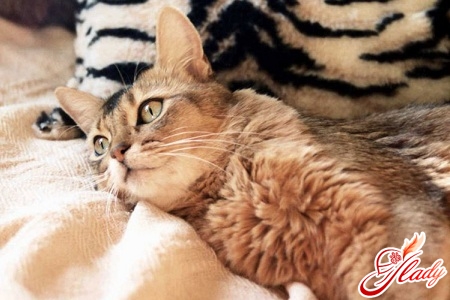
When should I see a doctor?
In no case can not exclude the possibility of diarrhea in a cat due to serious diseases. In what cases is it necessary to contact the veterinarian?
With similar symptoms accompanying diarrhea,it is necessary to urgently take the animal to the doctor or even call an ambulance veterinarian. Your cat will be examined, diagnosed and prescribed treatment. If your pet finds parasites, then you will begin the appropriate course of treatment. The animal will be prescribed special preparations with a certain regimen of reception and a diet. Usually in such cases, the treatment is repeated: in a few weeks - a second course. If dehydration of the body has already occurred, it is most likely that the animal will be prescribed a dropper: intravenously or subcutaneously. You will have to bring the cat to the clinic or call a specialist on the house. In any case, this procedure is necessary, since with diarrhea, a liquid drunk by a cat is too fast to leave the body. If diarrhea is caused by an infection, then the animal will be given a course of antibiotic treatment. So do not expect "at random". In severe cases, diarrhea does not pass by itself. Trust the doctor and approach the treatment responsibly. After all, your cat trusts you and is waiting for help from you. Do not deceive her hopes. And to prevent intestinal disorders, feed the animal correctly, in time to vaccinate, give the anthelmintic preparations at least once a season. And be (and you, and your pussy) are healthy! We advise you to read:




